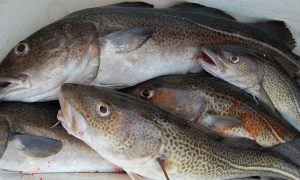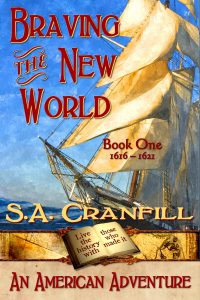
Photo from Pixabay by Susanna Winqvist
The Atlantic Codfish ~ America’s Founding “Fish Father”
It is March of 2020, the Year of the Mayflower, the 400th anniversary of the good ship’s New England arrival some 8 months future. What were the people we call our Pilgrim Fathers doing in March of 1620? They were dealing with, and arguing over, a new development on the business end of moving to America. Cooler heads had prevailed and they had given up on Guiana. Suddenly, in March 1620, New England was a possibility, and some of the Leyden (Netherlands) Pilgrims preferred that area over the Hudson River in Northern Virginia. (See our previous blog on where they were headed.)
 What had happened? There was an old “player” in John Smith’s New England, a knight turned investment adventurer named Sir Ferdinando Gorges, the governor of Plymouth Fort (England). He had long been interested in “the Maine,” financing the Popham colony in 1607. It failed. He sponsored John Smith in 1615, another failure. He sent Thomas Dermer with a native called Squanto in 1619 to explore and make peace with the tribes enraged over kidnappings, unknowingly providing the future Pilgrims with their salvation. Braving the New World Book One features narratives of these adventures.
What had happened? There was an old “player” in John Smith’s New England, a knight turned investment adventurer named Sir Ferdinando Gorges, the governor of Plymouth Fort (England). He had long been interested in “the Maine,” financing the Popham colony in 1607. It failed. He sponsored John Smith in 1615, another failure. He sent Thomas Dermer with a native called Squanto in 1619 to explore and make peace with the tribes enraged over kidnappings, unknowingly providing the future Pilgrims with their salvation. Braving the New World Book One features narratives of these adventures.
Now, in March 1620, along with “sundry honourable lords,” Gorges turned his interests away from the Northern Virginia Company and petitioned the King for a new charter for a new corporation called “The Council established at Plymouth (England) in the County of Devon for the planting (colonizing), ruling, ordering and governing of New-England in America.” That’s a mouthful, even for British lords, so they referred to it as the Council for New England. The kicker was that they asked for a fishing monopoly.
The West Country British and the Irish, Basques, Portuguese, and French had fished the cod banks off Newfoundland since the mid-, and probably the early, 1400s, beating Cabot there by a long shot. The cods were also big and thick around Monhegan Island off the coast of “the Maine” (which was mainland and not an island) in what John Smith would christen New England in 1614. The British and Europeans had been fishing there since at least the 1520s, a good while before Smith came exploring and before Bartholomew Gosnold named Cape Cod in 1602. Wind-dried, lightly salted cods fed Europe’s Catholics on Fridays and fueled the British Navy during wartime. And anyone else who needed storable, affordable protein. British ships loaded with cods traveled from Newfoundland and New England to Europe and the Mediterranean to trade for wine and other commodities which they took back to England. Cods made the Atlantic a busy place, from very early on.
A Controversial Monopoly
The King and Parliament had “gone off” monopolies ~ the sea should be free ~ and so the dispute over the new charter lasted until November 3, 1620 when the Mayflower was long gone and bearing down (unintentionally) on Cape Cod. The monopoly was actually granted, seriously raising the scruff on the neck of the Jamestown colonists. Jamestown ships fished Monhegan Island. A monopoly would bar the southern colony from an important source of food. Gorges writes about the squabble in Sir Ferdinando Gorges and His Province of Maine, Including The Brief Narration, The Brief Relation, His Defence, the Charter Granted to Him, His Will, and His Letters, Volume II, (1658), edited with A Memoir (in Volume I) by James Phinney Baxter, 1890, pg. 32 and forward [at Archive.org].
So, What Did the Fishing Monopoly Squabble Mean for the Pilgrims?
The point for the Pilgrims was that they had no choice but to keep the patent from the Virginia Company issued to their Adventurer John Pierce (one of those who bankrolled the Pilgrims with promise for future profits, a joint-stock arrangement). The squabble kept the Council for New England in limbo until after the Pilgrims’ departure. Thus, the Pilgrims were headed for Northern Virginia with the only patent they had, the only recognized claim to a new home, some place near the mouth of the Hudson River.
Yet, due to ship and weather delays, they ended up in New England anyway (or, as my good northern friends often say, “anyways”) on John Smith’s favorite spot which they named Plymouth due to his map.
History? Fate? Providence? The Pilgrim Fathers favored Providence. Disease had cleared the area which made it ripe for the claiming. Squanto awaited them. The unusually cold winter cost them dearly, but the future development of New England and America as we know it hung in the balance. Interesting. And all because of the cod fish.
[See William Bradford’s Of Plymouth Plantation, particularly the Samuel Eliot Morison edition (pgs. 38, 39, 81), plus Fish into Wine by Peter E. Pope, and the writings of Gorges and Smith.]

